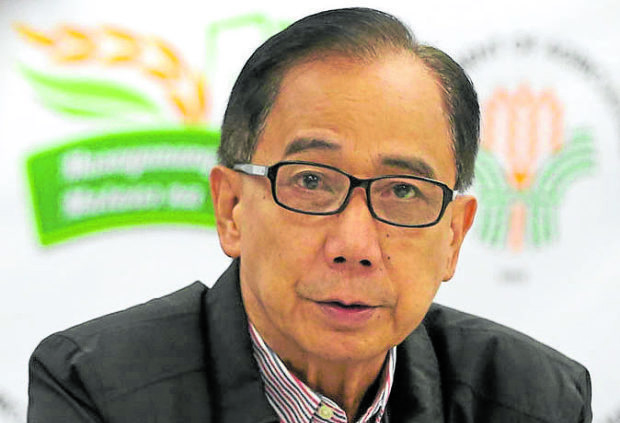Bayanihan 2 aid slow to reach farmers – COA

Agriculture Secretary William Dar. INQUIRER FILE PHOTO / NINO JESUS ORBETA
MANILA, Philippines — Last December, the government promised to give each palay farmer P10,000 in cash assistance to tide them over the COVID-19 pandemic. Until now, however, farmer leader Edwin Paraluman said many of them in the Soccsksargen region were still waiting for this financial aid.
State auditors may have the answer as to why it was long in coming, or why it might not arrive at all.
In its report on the Department of Agriculture’s (DA) fund usage last year, the Commission on Audit (COA) found out that P9.8 billion of the agency’s P59.81 billion in cash allocation was not used and reverted to state coffers, while another P4.55 billion was not released by the Department of Budget and Management (DBM).
This included the P2.2 billion committed to the DA under the Bayanihan to Recover as One Act or Bayanihan 2 law that the agency was supposed to provide as direct cash assistance and low-interest rate subsidies to farmers and fisherfolk.
The COA report noted “delays in the procurement process and discontinuance of implemented projects to address the emergency situation brought by COVID-19, among others,” and deprived farmers of government support that was meant for them.
Article continues after this advertisementThe DA was actually flagged by state auditors for irregularities involving P34.45 billion of its funds, or more than half of its budget last year.
Article continues after this advertisementThe COA cited several deficiencies on the DA’s part, including the absence of subsidiary ledgers and lack of records on 379 accounts totaling P32.36 billion, as well as accounting errors and omissions amounting to P2.09 billion.
State abandonment
The Pambansang Lakas ng Kilusang Mamamalakaya ng Pilipinas has demanded an explanation from the DA, adding that the mishandling of the funds was tantamount to state abandonment of the country’s food security front-liners.
“The unspent funds could have addressed the worsening plight of our rural sectors enduring the onslaught of the pandemic since last year. The budget is very crucial to the rural sectors especially this was the year when aside from the government’s burdening pandemic response, natural calamities including typhoons devastated fishing and farming communities,” the group said.
Progressive farmers’ group Kilusang Magbubukid ng Pilipinas said the unused and unobligated funds could have benefited more than 980,000 farmers with cash aid, which many farmer and fisherfolk groups had been clamoring for since March last year.
Technicalities
Reached for comment on Wednesday, DA director for financial and management service Miriam Cornelio said the agency was given until the end of this month to clarify the COA’s audit observations, adding that the annual report for last year did not reflect improvements in the agency’s use of funds.
She added that the availability of the money under the Bayanihan 2 law was extended until June this year and could still be used to augment the needs of farmers and fishers.
“Errors in our accounting records don’t show the actual monetary value that may have been misused. Rather, these are only technicalities that were overlooked, which we are currently fixing until the deadline,” Cornelio said.
Even before the COA released its 2020 audit report, the DA was already criticized for its P1.8-billion fertilizer supply deal that farmers claimed was not only overpriced but also forced farmers to turn to loan sharks.
The DA stressed, however, that the program logged a distribution rate of 98 percent among rice farmers particularly in Ilocos Norte, Ilocos Sur and Isabela provinces.
“Such performance clearly refutes the misleading information … that the distribution of fertilizers to rice farmers funded under Bayanihan 2 was anomalous,” said Agriculture Secretary William Dar.
“Since we assumed office in August 2019, we have been and continue to be transparent in all our transactions, democratizing and making our bidding and procurement process more transparent and equitable,” he added.
On top of its annual budget for this year, the DA got additional funds through the Bayanihan laws, the annual P10-billion rice competitiveness enhancement fund, and tariff revenues from agricultural imports that were allotted for specific DA programs.
Bigger budget
Despite the COA findings, the DA earlier sought an increase in its fund allocation for next year to P240 billion, although this was immediately trimmed by the DBM to P79.9 billion.
Dar said the additional budget would have been used to increase financial support to other subsectors aside from crops, especially to the livestock subsector that continued to be hounded by the effects of the African swine fever.
“There was no explanation [for the cut],” Dar said in an earlier interview. “Another P20 billion on top of the adjusted proposal would be a good addition.”
He said they would continue to drum up support from various stakeholders to get a bigger budget for 2021.
“We have seen why we need more budget. In rice, if you bring in all the rice budgetary support, that’s almost P79 billion and you have seen the outcome. The higher the investment, the higher the outcome,” he added.
For more news about the novel coronavirus click here.
What you need to know about Coronavirus.
For more information on COVID-19, call the DOH Hotline: (02) 86517800 local 1149/1150.
The Inquirer Foundation supports our healthcare frontliners and is still accepting cash donations to be deposited at Banco de Oro (BDO) current account #007960018860 or donate through PayMaya using this link.